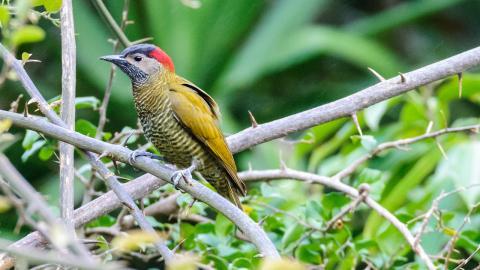
A Challenging Dichotomy
A pale hand, unseasoned by sun or the wild, sat in awkward juxtaposition next to that of a tan, rough version belonging to a man from Belgium—a desperately telling picture in the consideration of the curious existence of Costa Rica’s ecotourism economy. My hand gripped the edge of a mosaic-crusted table, roughly 8 inches from the relaxed palm of Thijs Claes (pronounced Tess Class), The biologist leading the bird conservation project for Global Vision International in Tortuguero National Park. I leaned further forward with excitement as he detailed his work with sea turtles, poaching culture, jungle birds, and the Costa Rican Government.
Thijs Claes explained that Costa Rica does an exceptional job of protecting nature, but they still face challenges in studying and developing the lush biology of the country. In the last 40 years, Costa Rica’s economy has exploded with an influx of ecotourism, but reinvesting directly into growing the sustainable consciousness of this region of the world is easier said than done. While ecotourism initiatives require very few resources to get off the ground and present incredible opportunity for all who have a will to live in a balanced way within the natural world, they do present unique challenges when applied to an entire culture. As incredibly positive as ecotourism can be for a community or a country, there are significant barriers that present themselves on all levels—challenges that need to be addressed if the biodiversity of Costa Rica, and arguably, the wider world, is to be maintained.
The Revolving Door of Ecotourism
As I ended my interview with Thijs, he reiterated something he had said quite a few times throughout our discussion: “Come to Costa Rica because it’s a beautiful place, don’t just come and look. Support it, study it, spread the word.” What he was speaking to was specifically the tourist aspect of the term ecotourism. It’s a simple thing to come to a place that has intentionally made the deep beauty of its ecology something that is accessible to all who find such things enticing. The human habit of seeing without understanding finds no exception in the ecotourist economy of Costa Rica. While avoiding overgeneralization, it is safe to say that too many come and go without truly being impacted by the broader implications of such a diverse and natural place.
Too Much Traffic
Global Vision International (or GVI) as a volunteer organization provides cooperative and collaborative resources and support to the communities with which they are involved. GVI works with the community of Tortuguero inside of Tortuguero National Park. Thijs explained that since the ecotourism boom in Costa Rica, and with the help of GVI, The Community of Tortuguero has transformed its economy into one that has allowed for it to largely live in sustainable balance with the ecosystem around it: What was once a consumable resource is now secondary growth rainforest.
Despite this change in the tenor of mentality in Tortuguero, the development of the community is incidentally harming the very environment that they care for. The artificial lights of the town are now bright enough that they are beginning to confuse the baby sea turtles as they hatch and find safety in the depths of the Pacific Ocean. Finding a solution is tricky, but simply, if there were more preserved wilderness to bring those populations of endangered turtles back to safe breeding grounds year and again, such problems would be less pervasive.
The Governmental Component
The night before sitting down with Thijs, I had talked with him over a game of pool. The second I expressed interest in his work, he pulled out his phone and asked if I was interested in seeing pictures from his day-to-day work. An enthusiastic nod and a few swipes later, I was introduced to a living world that I was certain either came forth from the mind of Pixar’s creative team or from the most vibrant and absurd corners of National Geographic’s photo library.
Costa Rica contains 6% of the world's biodiversity and .03 percent of its landmass. If one were to equate that to human population, that would be like trying to fit the combined populations of the United States and Mexico into an area roughly half the size of Cuba: layers on layers of biodiversity in a depth that modern science still has a limited understanding of.
Between the liberal humanitarian politics of the 1949 administration that disbanded the military, the fortunate avoidance of the Roosevelt administration’s gunboat diplomacy, and the subsequent collapse of the banana and coffee trade in the 1970s as the land lost its ability to support such agriculture, Costa Rica found itself in a unique position. Regrettably, the surrounding countries found themselves embroiled with cold war era proxy conflicts and continuous ecological destruction.
Thijs Claes, in concise solemnity, explained the discrepancy that appears between the people’s understanding of the land and the government’s. Though ecotourism is a relatively inexpensive venture for many communities to initiate, it requires governmental cooperation and legal support. One cannot bring tourists to the rivers of Central America to drink of its natural splendor when the river is being polluted upstream. Though the importance of economic health is acknowledged by most, public opinion does not always translate to legislation.
The Path Ahead
In a landscape dotted with expats running off-the-grid eco farms, zipline tour companies, and the ever-present ebb and flow of the tide of international travelers finding their way to the buzzing jungle from every corner of the world, the future of this small country is certainly brimming with potential. The kind of people who gather, while maybe not fully attached to the depth and importance of their surroundings, do still care, are still aware to some degree. The policies of this country have led to the preservation of unimaginable natural diversity and maybe with cooperation and a little luck might serve as a blueprint for others wishing to follow in their reverent footsteps.
As with anywhere, navigating the difficulties of concentrated humanity is invariably difficult, but the simple fact that the biodiversity of this country’s ecology has led to an incredible diversity in cultural presence, global perspectives, and ideologies is uniquely beautiful. As so frequently tends to be the case, integrated diversity finds itself on the other side of so many questions. In my mind, Costa Rica represents that simple truth perfectly.








